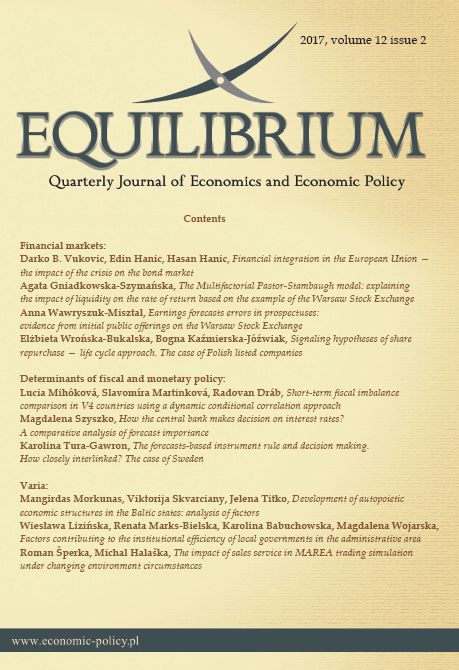SIGNALING HYPOTHESES OF SHARE REPURCHASE – LIFE CYCLE APPROACH. THE CASE OF POLISH LISTED COMPANIES
SIGNALING HYPOTHESES OF SHARE REPURCHASE – LIFE CYCLE APPROACH. THE CASE OF POLISH LISTED COMPANIES
Author(s): Elżbieta Wrońska-Bukalska, Bogna Kaźmierska-JóźwiakSubject(s): Economy, Financial Markets
Published by: Instytut Badań Gospodarczych
Keywords: share repurchase; signaling hypotheses; business life cycle
Summary/Abstract: Research background: Payout policy has attracted a great deal of research, how-ever it still has not been satisfactorily explained why corporations repurchase their shares. The most popular explanation for share repurchases is their signaling power. An alternative explanation for share repurchases is related to free cash flow. We assume that both theories are not competitive, due to the fact that the motives for share repurchases may differ depending on the firm’s life cycle stage. Purpose of the article: The aim of the paper is to test the hypotheses that companies in growth stage are more prone to repurchase their shares due to the their undervaluation. Methods: Our analysis focuses on 116 repurchase on WSE and 47 repurchase on NewCon-nect in Poland during the period 2004–2016 to test the hypothesis. We assume that companies listed on WSE are in their mature stage while listed on NewConnect are in the growth stage. We use market value to book the value ratio (M/BV) and the relation of M/BV ratio for the repurchasing company to the M/BV ratio for the whole market at the date of implementing share repurchase program as a proxies for firm valuation. Findings & Value added: Our study does not confirm that repurchased companies at a growth stage are more undervalued than repurchased companies at a mature stage (at statistically significant level), however there are more repurchased companies at a growth stage with lower M/BV value than repurchase companies in mature stage. Adding corporate life cycle theory into the study, our result can contribute to the literature by more distinctly understanding the motivation of share repurchases. The results might be helpful for companies to determine their financial policies and for investors to determine their investment decisions.
Journal: Equilibrium. Quarterly Journal of Economics and Economic Policy
- Issue Year: 12/2017
- Issue No: 2
- Page Range: 245-257
- Page Count: 13
- Language: English

